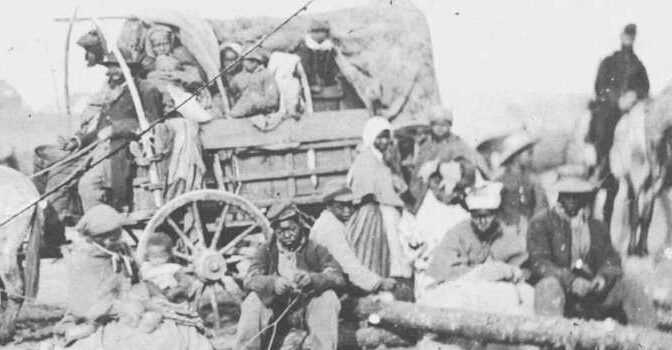Bennett Parten Somewhere Toward Freedom review, recensie en informatie boek over de Amerikaanse Burgeroorlog en General Sherman’s March vanuit het perspectief van zwarte Amerikanen. Op 21 januari 2025 verschijnt bij Simon & Schuster het boek van de Amerikaanse historicus Bennett Parten over Sherman’s March and the Story of America’s Largest Emancipation. Hier lees je informatie over de inhoud van het Amerikaanse geschiedenisboek, de auteur en over de uitgave. Een Nederlandse vertaling van het boek is niet verkrijgbaar.
Bennett Parten Somewhere Toward Freedom, review, recensie en informatie
- “Somewhere Toward Freedom is one of the most innovative studies of American emancipation in the Civil War we have ever seen, from the March to the Sea in Georgia and well beyond. An epic tale of movement, of collisions with nature, of military history of a new kind in the annals of American warfare, and of the great human drama—full of loss and tragedy and confusion—of an evolving freedom for former slaves across a vast landscape.” (David W. Blight, Pulitzer Prize–winning author of Frederick Douglass)
- “A well-known episode in Civil War history viewed from a fresh, and illuminating, perspective.” (Kirkus Reviews)
Somewhere Toward Freedom
Sherman’s March and the Story of America’s Largest Emancipation
- Auteur: Bennett Parten (Verenigde Staten)
- Soort boek: Amerikaanse geschiedenis
- Taal: Engels
- Uitgever: Simon & Schuster
- Verschijnt: 21 januari 2025
- Omvang: 272 pagina’s
- Prijs: $ 29.99 / $ 14.99
- Boek bestellen bij: Amazon / Bol / Libris
Flaptekst van het boek van Bennett Parten over de Amerikaanse Burgeroorlog
A groundbreaking account of Sherman’s March to the Sea—the critical Civil War campaign that destroyed the Confederacy—told for the first time from the perspective of the tens of thousands of enslaved people who fled to the Union lines and transformed Sherman’s march into the biggest liberation event in American history.
In the fall of 1864, Gen. William T. Sherman led his army through Atlanta, Georgia, burning buildings of military significance—and ultimately most of the city—along the way. From Atlanta, they marched across the state to the most important city at the time: Savannah.
Mired in the deep of the South with no reliable supply lines, Sherman’s army had to live off the land and the provisions on the plantations they seized along the way. As the army marched to the east, plantation owners fled, but even before they did so, slaves self-emancipated to Union lines. By the time the army seized Savannah in December, as many as 20,000 enslaved people had attached themselves to Sherman’s army. They endured hardships, marching as much as twenty miles a day—often without food or shelter from the winter weather—and at times Union commanders discouraged and even prevented the self-emancipated from staying with the army. Racism was not confined to the Confederacy.
In Somewhere Toward Freedom, historian Bennett Parten brilliantly reframes this seminal episode in Civil War history. He not only helps us understand how Sherman’s March impacted the war, and what it meant to the enslaved, but also reveals how it laid the foundation for the fledging efforts of Reconstruction. When the war ended, Sherman and various government and private aid agencies seized plantation lands—particularly in the sea islands off the Georgia and South Carolina coasts—in order to resettle the newly emancipated. They were fed, housed, and in some instances, taught to read and write. This first real effort at Reconstruction was short-lived, however. As federal troops withdrew to the north, Confederate sympathizers and Southern landowners eventually brought about the downfall of this program.
Sherman’s march has remained controversial to this day. But as Parten reveals, it played a significant role in ending the Civil War, due in no small part to the efforts of the tens of thousands of enslaved people who became a part of it. In Somewhere Toward Freedom, this critical moment in American history has finally been given the attention it deserves.
Bennett Parten is an assistant professor of history at Georgia Southern University whose area of expertise is the Civil War period. He is a native of Royston, Georgia, and completed his PhD in history at Yale University. His writing has appeared in The Washington Post, Los Angeles Review of Books, Zocalo Public Square, and The Civil War Monitor, among others. He currently lives in Savannah, Georgia.


